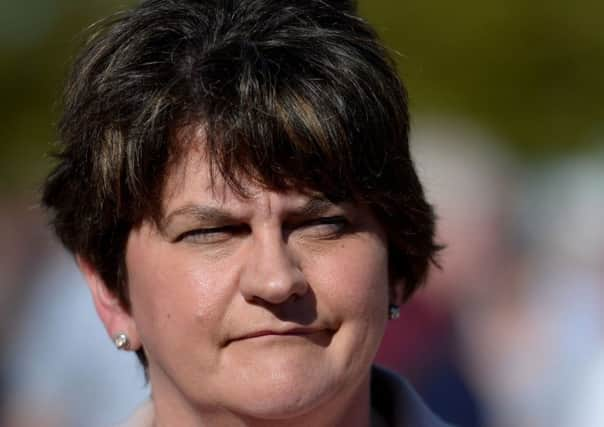Obstructionist Dublin paving way for no-deal, says DUP leader


The DUP leader specifically referenced comments from Irish deputy premier Simon Coveney, who rejected the idea that any party could trigger a contentious Stormont voting mechanism to veto the plan for an all-island regulatory zone.
The DUP leader accused Mr Coveney of rejecting a reasonable offer and paving the road for a no-deal exit.
Advertisement
Hide AdAdvertisement
Hide AdBoris Johnson is proposing that Northern Ireland effectively stays in the EU single market, subject to input from Stormont on whether or not to adopt regulations, and that the Province leaves the customs union like the rest of the UK.
This would lead to regulatory checks in the Irish Sea, but customs (tariff) divergence at the Irish land border, but the UK says that the latter would not mean checks.
Mr Coveney said that, while the plan tabled by the UK did not provide the basis for a final agreement with the EU, it did represent “progress” and could potentially be a “stepping stone” towards a resolution.
Addressing the Dail parliament, Mr Coveney said: “We cannot support any proposal that essentially suggests that a minority can determine what the majority have to live with, it’s just not going to work.
Advertisement
Hide AdAdvertisement
Hide Ad“And if that is the proposal, I believe it would be very, very difficult to get an Executive up and running.
“Why would other parties buy into an Executive if they believe that Executive could essentially prevent solutions linked to Brexit?”
The tanaiste said he believed Mr Johnson wants a deal, but added: “Ireland has not been treated well at different periods during these negotiations, because the policy and the proposals and the approach of the UK has shifted towards Ireland at different times.”
Mrs Foster said: “Simon Coveney’s remarks are deeply unhelpful, obstructionist and intransigent.
Advertisement
Hide AdAdvertisement
Hide Ad“The Irish government’s majoritarian desire to ride roughshod over unionism was one of the reasons why the Withdrawal Agreement was rejected.
“Mr Coveney’s rejection of a reasonable offer is paving the road for a no-deal exit because unionism will not allow Northern Ireland to be trapped at the whim of Dublin or the EU. We will not buy that.”
Ms Foster added: “The Irish government’s preparedness to dump the consent principle for their country’s expediency is foolish in the extreme and sends a very clear message to unionists.
“There will be no return to the flawed backstop. We will leave the EU, customs union and single market alongside the rest of the United Kingdom.”
Advertisement
Hide AdAdvertisement
Hide AdTUV leader Jim Allister has called on the DUP to “come clean on regulatory border intentions”.
He said: “Having embraced the Boris proposals, which are premised on a regulatory border down the Irish Sea, the DUP is furiously trying to divert attention from their climbdown by playing up what they term the unionist veto in an Assembly which doesn’t exist.”
Mr Allister said it will be interesting to see if the proposed veto survives the negotiations, and added: “Will the DUP pledge to exercise that veto, no ifs, no buts? Or, is the veto only for the sales pitch optics?
“And what if there is no sitting Assembly? Unionists are entitled to an unequivocal answer from the DUP as to whether it will permit an all-Ireland economic zone on all goods, exclusively under EU rules, and the resulting regulatory border in the Irish Sea.”
The News Letter asked the DUP about its latest position.
Advertisement
Hide AdAdvertisement
Hide AdIn a statement, the party responded, saying it had “sought and won the commitment in the PM’s proposals for the prior and ongoing consent of the Executive and the Assembly to any regulatory divergence” between NI and the rest of the UK.
“This is based on Paragraph 50 of the Joint Report of December 2017, which we got inserted and which was agreed between the UK and the EU.
“An all-Ireland economic zone on all goods, exclusively under EU rules, and the resulting regulatory border in the Irish Sea is not something we would support. There are of course already areas like the Single Electricity Market, where for sound economically beneficial reasons it makes sense for Northern Ireland to be in separate arrangements.”
The statement adds: “The prime minister ... has already made clear that in all circumstances consent is required from both unionists and nationalists and that of course remains our position.”